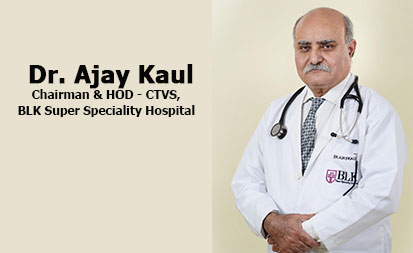Patients diagnosed with Covid-19 may have prolonged or severe cardiovascular diseases, Even If You Have Recovered the Illness.
By- Dr. Ajay Kaul, Chairman & HOD - CTVS, BLK Super Speciality Hospital. When Wuhan had its first COVID-19 casualty, little did the global doctors know what they were getting into. It belonged to the Corona Virus

By- Dr. Ajay Kaul, Chairman & HOD – CTVS, BLK Super Speciality Hospital.
When Wuhan had its first COVID-19 casualty, little did the global doctors know what they were getting into. It belonged to the Corona Virus family and yet, it seemed nearly impossible at first to determine its causes, side effects, and treatment. Fast forward to today, the world has already had 28.3 million cases with 9,13,000 deaths. The only silver lining is that we have about 19.1 million recovered cases to tell the post-COVID tale.
However, people who have had the virus and recovered had complications to deal with. Even the people who had mild versions of this infection kept on encountering problems after their healing. Then there were older patients and patients with several underlying ailments likely to experience COVID-19 side effects. Even though the novel coronavirus is viewed as an ailment that fundamentally effects the lungs, it can harm numerous several other organs too. This organ failure may additionally expand the danger of long-term medical issues associated with the disease.
The probability of a patient leading to persistent symptoms is difficult to track since various researches lead to different results and follow survivors for various timeframes. One such research in Italy found that 87% of patients recovered from COVID-19 were still battling issues 2 months later. Information from the COVID Symptom Study, which utilizes an application into which a great many individuals in the United States, United Kingdom, and Sweden have shared their symptoms, recommend 10% to 15% of individuals—including some “mild” cases—don’t rapidly recover. Be that as it may, with the virus only few months old, nobody knows how far into the future individuals will have to bear the side effects, and whether COVID-19 will incite the beginning of an endless illnesses.
Research done in JAMA Cardiology proposes that in numerous patients, Covid-19 could plead to cardiovascular damage, an incessant, dynamic condition in which the heart’s capacity to pump blood all through the body decreases. It is too early to state if the harm in patients recovering from Covid-19 is transient or chronic, however cardiologists are worried that it may lead to a permanent organ damage. Their paper found that 78 of 100 individuals who had COVID-19 also had cardiac variations when their heart was imaged on a gap of 10 weeks from their diagnose, accompanies by regularly inflammation in the heart muscle. A significant number of participants in that review were strong and physically healthy.
These Imaging tests have indicated enduring side effects to the heart muscle, even in individuals who experienced just mild COVID-19 side effects. This may build the danger of cardiovascular failure or other heart problems in the future. However, results following SARS-CoV-2 additionally seem different in both hopeful and demoralizing manners. Early this year, numerous specialists dreaded the infection would lead to extensive and permanent lung failure for many survivors since the other two variations of the coronavirus, namely SARS and MERS, had the ability damage the lungs. One study of healthcare workers with SARS in 2003 found that those with lung injuries 1 year after disease despite everything had them after 15 years of the diagnose.
Another examination discovered that about 16% patients had arrhythmia. As per the American College of Cardiology there were likewise instances of intense cardiovascular failure, heart attack and cardiac arrest after the infection.
Specialists state that being put in a medical clinic’s emergency unit bring about post-intensive care syndrome, which incorporates decreased physical capacities and psychological disability. Additionally, the COVID could even impact a part of the brain associated with breathing and circulation having lesser known side effects.
Coronavirus can make blood cells bound to get together and form clusters. While enormous clusters can cause coronary failures and strokes, a significant part of the heart failure brought by COVID-19 is accepted to come from little clots that block the small veins (vessels) in the heart muscle. Other organs that can get affected by these blood clots are the lungs, legs, liver and kidneys. Coronavirus can likewise hamper the veins, which adds to possibly chronic ailments involving the liver and kidneys.
Coronavirus can be an extreme sickness, particularly in individuals more than 60 years old or those with constant ailments like diabetes and cardiovascular issues. Impeded lung damage from SARS-CoV-2 disease can also impact other organs like the heart, kidneys, and brain, with noteworthy damages that may show years after getting over the disease.






